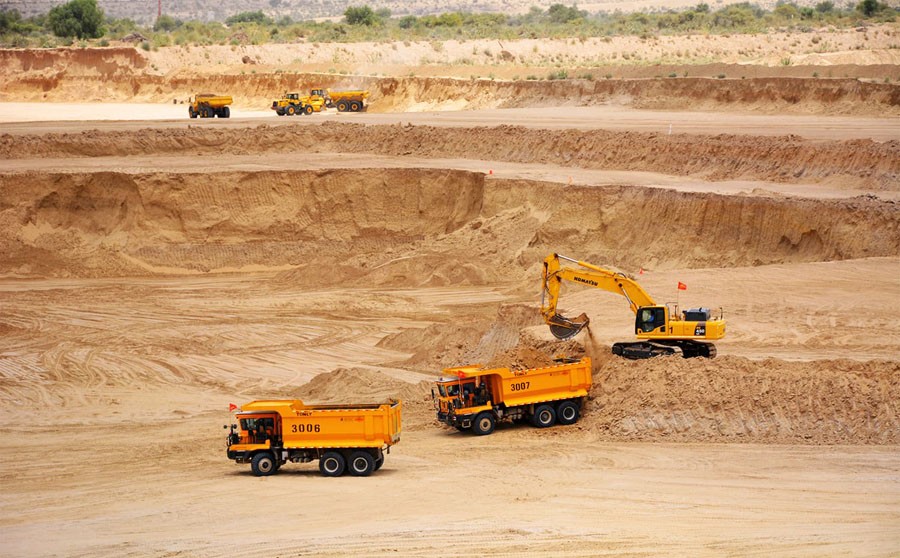
Our inability to exploit rich resources perpetuates poverty

Mineral rich, Pakistan happens to be the 10th top agricultural country, globally. It is the 4th top producer of cotton crop as well as milk and fruits like mango and dates, while Pakistan stands at 9th position in wheat production, 11th position in sugarcane, 13th in rice and citrus fruits, 16th in cereals and pulses, 21st in oil crops, 24th in vegetables, jute and jute products.
The share of agriculture sector in the country’s GDP is around 20 per cent, while it accommodates roughly 44 per cent of its labour force and contributes 65 per cent to exports.
Despite these rosy statistics, the country has to import a number of agricultural products to meet its domestic needs. Why: because of our inability to reap optimum benefits from the nature’s bliss as a result of continuing to follow primitive practices, both in mining and agriculture, and lack of value addition, proper packaging and aggressive marketing techniques.
In mineral resources, according to studies, Pakistan can meet the country’s requirements for energy, growth and new job opportunities for about 400 years. A cursory glance over the country’s natural resources shows that it has the largest rock salt deposits in the world, while its coal reserves are the 4th largest on the globe. Its biggest coal-field at Thar has an estimated 1.75 billion tonnes of lignite coal, which can generate 50,000 MW of electricity and 100 million barrels of oil annually for over 400 years.
In addition to Thar, the country also possesses substantial coal reserves in other regions, which can also be exploited for producing energy or put to other productive uses.
Likewise, the world’s second biggest gold and copper reserves at Reko Diq, in Chaghai (Balochistan), also remain to be exploited. Spread over a vast area, these reserves can yield gold and copper worth 1,000 billion dollars, but for one reason or the other we have not been able to exploit these reserves so far.
Pakistan has some 117 types of marble and granite, whereas our neighbouring countries have less than 20 types of stones. Pakistan’s vast strip of marble and granite, which stretches from Las Bela (Balochistan) to Siachin (Northern Areas), can be profitably mined for over 300 years. But, the country’s current marble/granite exports are less than the exports of other major countries in the region.
Currently, Pakistan meets 75 per cent of its edible oil needs through imports, against 70 per cent till the last decade. The country’s dependence upon imported edible oils is constantly rising though it has the potential to achieve autarky in edible oils.
With temperatures ranging between 24 to 35 degrees centigrade, the coastal zones of Sindh and Balochistan are suited for oil palm cultivation at places where fresh water is available for irrigation. Some 300,000 acres of land has been identified to be suitable for oil palm cultivation in Sindh, while 200,000 acres of land is reported to be ideal for oil palm cultivation in Balochistan.
Pakistan has great potential for olive cultivation as well, according to experts, and earning about US$10 billion annually by bringing its cultivable potential waste lands under olive cultivation besides converting eight million wild olive trees, present in different regions, into productive trees through grafting.
Currently, Pakistan is one of the largest tea importing countries of the world, trailing only after the top importer England. While large quantities of tea are smuggled into the country, Pakistan spent over Rs31.1 billion on importing 141,257 metric tonnes of black tea and 332 tonnes of green tea in 2014-15. The quantity for the fiscal year 2015-16 is estimated to have risen to 190,000 metric tonnes.
After conducting research decades ago, experts have identified 500,000 acres of land to be suitable for commercial cultivation of tea in Khyber Pakhtunkhwa province and 4,942 acres in Azad Jammu and Kashmir. But, the country’s dependence on the imported tea has been constantly rising for want of commitment and dedicated efforts to achieve autarky in tea. If the will is there, Pakistan can easily increase its tea production not only to meet its domestic demand but also to export the surplus quantity.
Among others, the key concerns with respect to agriculture sector remains low yield, poor performance of the livestock sub-sector, and near absence of cold chain system for fisheries, fruits and vegetables.
Whatever may be the reason, the vast natural resources of the country yet remain to be fully exploited and tapped, while the people continue to face shortages, unemployment, inflation and poverty, and the country is burdened with bulging debts, revenue shortfall, deterioration in infrastructure and worsening socio-economic conditions.
The mismanagement, incompetence and bad governance often instils one’s mind with the thought that why are we unable to exploit our natural resources expeditiously? Perhaps, we have been facing such a situation due to self-serving policies, lack of commitment, dedication and focused approach of people at the helm of affairs.
The situation is challenging, indeed. But, challenges are opportunities that enable nations to discover their talents and actual potential and also the shortcomings, weaknesses and deficiencies in their systems. By tackling the negative factors, many nations could embark on the road to rapid growth, progress and prosperity. The people who accomplished this task even in a metropolis, state or province, ultimately, rose to fame and glory, becoming adorable leaders of their nations.
Instead of focusing on growth, development and emancipation of the people, alas, some of our leaders have started indulging in politics of agitations, behaving like traditional villains and becoming instrumental in further arresting the pace of development and national growth. When would our politicians learn to behave like mature and seasoned leaders? When would they be solely guided by the national interest instead of self-seeking policies bordering on grudges, personal animosity, vengeance and vendetta?
Wisdom demands that national interest alone should be the only criterion for tackling issues, chalking out policies and leading the nation towards progress and prosperity.